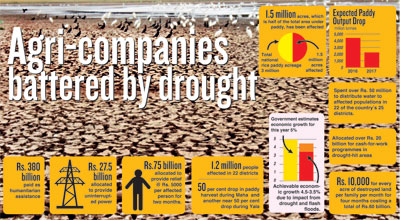Agri-companies battered by drought
View(s):
By Bandula Sirimanna, Duruthu Edirimuni Chandrasekera and Sunimalee Dias
Battered by drought and hammered by losses as diminishing purchasing power eats into agriculture-linked companies, Sri Lanka’s public and private sectors are feeling the twin effects of erratic weather and sinking cash flows following the worst drought in 40 years.
While the government has been forced to cough up Rs. 380 billion as humanitarian assistance, companies exposed to the farming economy are counting losses that could run into millions of rupees. Some firms are considering staff cuts with voluntary retirement packages.
At least one company, Lankem Ceylon PLC has taken a Rs. 500 million hit, reporting a loss of Rs.731.46 million in the year ending March 31, 2017 from Rs. 254.58 million in the previous year attributing the decline to ‘inclement weather and higher finance costs”.
The drought since last October, broken in a few areas like the south and western parts with flash floods in May, has affected 1.2 million people and seen a 50 per cent drop in, the paddy harvest during Maha (September-March) and another near 50 per cent drop during Yala (May-August). The Ceylon Chamber of Commerce says paddy output this year is expected to drop sharply to 2.267 million tonnes from 4.420 million tonnes in 2016.
While the last few quarters for the country’s publicly-listed firms in the agriculture business sector have been grim owing to lesser purchases from the farming community, commercial banks have not seen any major fallout.
The Business Times found that banks are currently engaged in helping farmers and businesses cope with the current crisis – be it floods or drought. Some banks are also rescheduling loans and repayments to those affected while also advising businesses to look at other ways of doing business.
Cash-for-work
A senior Treasury official said that the Treasury has already allocated over Rs. 20 billion for cash-for-work programmes in drought-hit areas and spent over Rs. 50 million to distribute water to affected populations in 22 of the country’s 25 districts.
Another Rs. 27.5 billion over the last four months has been spent to provide uninterrupted power while the extra costs on power generation would soar to Rs. 50 billion, he said. Another Rs.75 billion is being spent on providing relief items worth Rs. 5000 per person among affected people for two months.
In other costs, the Government will provide Rs. 10,000 for every acre of destroyed land per family per month for four months costing a total of Rs.60 billion. Estimates show that around half of the national rice paddy acreage – 1.5 million acres has been affected.
Officials said the agriculture sector is unlikely to gain a full recovery in 2017, even if sufficient rain falls during the rest of the year. To encourage imports, Sri Lanka has cut import taxes on several commodities but triggered a howl of protest from exporters (See Page 9). While government planners estimate economic growth this year at 5 per cent, economic experts said growth for the year could be around 4.5 to 3.5 per cent due to the impact from drought and flash floods.
Despite the battering in the agriculture sector and uneven weather patterns, Diesel and Motor Engineering Company PLC is going ahead with a planned agriculture farm project. “Climatic changes are always there and we can’t control them. We aim to do structured, sustainable farming,” Ranjith Pandithage, its Managing Director told the Business Times.
A Hayleys PLC official said that climate change impacts remain a key concern as availability of raw materials can limit the growth potential of core sectors. “It’s up to the authorities to encourage establishing policies to support exports, agriculture and the plantations,” he said.
Market analysts said that crop shortage/failure, adverse weather escalation of paddy prices, state intervention including fixing of price ceilings and ad hoc policy changes have adversely affected the viability of the rice business.
The failure of both monsoons resulted in a significant reduction in crop production and market demand for agriculture inputs. The fertilizer industry too recorded a 40 per cent drop in usage with fertilizer firms such as Agstar PLC also challenged. “It’s especially concerning when you consider that farmers in several other parts of the country have already lost large expanses of crops to drought. It’s going to be a long time before Sri Lanka’s food production returns to normal,” an analyst said noting that agri-based firms are at the receiving end of all this mayhem.
Leasing
Leasing firms are also bracing for change in their bottom lines owing to the adverse weather conditions. The demand for their products has dropped drastically, many leasing and finance companies, told the Business Times.
The impact on tea has been significant for smallholders as opposed to regional tea planters. The Tea Small Holdings Development Authority in May stated that a total estimate of over 6,000 hectares of smallholders’ tea plantations has been affected and approximately 1,365 hectares fully damaged by the landslides and floods.
The authority says it would take up to four years for the fully affected areas to regain normalcy.
Kishu Gomes, Managing Director Chevron Lubricants PLC noted that while they aren’t directly involved in the agriculture sector, the company’s business in the North Central, East and North is heavily dependent on performance of the agriculture sector.
“The Government has claimed 50 per cent reduction in paddy harvest and recent duty reductions on essential items and relief package to farmers affected by the drought goes to show the negative implications on the economy. I believe the Central Bank will quantify the economic impact soon, but I hear consumption drops are between 10-20 per cent across many industries including FMCG,” he noted to the Business Times. Companies like Singer have also been affected owing to a drop in the purchasing power of farming communities.



